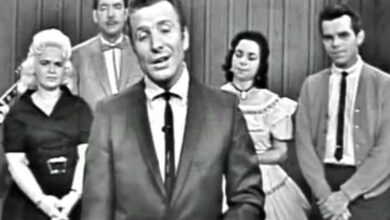Bread’s “Make It with You” – A Soft Rock Classic That Defined an Era
When “Make It with You” was released in 1970, it became an unexpected yet defining hit of the era, marking Bread’s emergence as one of the leading pioneers of soft rock. The song, characterized by its smooth melody and romantic lyrics, resonated with listeners who sought a more intimate and introspective alternative to the dominant rock sound of the time. Written by the band’s frontman, David Gates, the track soared to No. 1 on the Billboard Hot 100, making it Bread’s first and only song to achieve this top position. While many of their subsequent hits would enjoy commercial success, “Make It with You” remains the band’s signature tune, emblematic of the early 1970s’ shift toward mellow, acoustic-driven rock.
Bread was formed in Los Angeles in 1968, comprising David Gates, James Griffin, Robb Royer, and later, Mike Botts and Larry Knechtel. Gates, a multi-instrumentalist and seasoned songwriter, had already built a solid reputation in the industry, having penned songs for artists like The Monkees and Glen Campbell. His ability to craft tender melodies and poignant lyrics set Bread apart from many of their contemporaries. While the late 1960s were dominated by psychedelic rock and the raw energy of hard rock, Bread took a different approach—blending folk, pop, and rock elements to create a softer, more melodic sound. This stylistic choice would later earn them a place in history as one of the defining bands of the soft rock genre.
The inspiration behind “Make It with You” stemmed from Gates’ deeply personal songwriting style, which often revolved around themes of love and longing. He wrote the song as an earnest expression of commitment and hope, crafting lyrics that conveyed both vulnerability and optimism. Unlike many love songs of the time, which focused on heartache or unfulfilled desire, “Make It with You” presented a hopeful proposition—an invitation to build a future together. Gates’ gentle vocal delivery added an intimate quality to the lyrics, making the song feel like a private conversation between lovers rather than a grand declaration.
The recording process for “Make It with You” reflected the band’s understated yet meticulous approach to production. Gates not only wrote and sang the song but also played multiple instruments on the track, including acoustic guitar and bass. The song’s delicate arrangement featured soft percussion, warm electric piano chords, and lush harmonies, all contributing to its dreamy, romantic feel. The production, handled by Gates himself, emphasized clarity and warmth, ensuring that every element served the song’s emotional core. Unlike the heavily layered and complex recordings of some contemporaries, “Make It with You” thrived on its simplicity, allowing the melody and lyrics to take center stage.
Upon its release, “Make It with You” quickly climbed the charts, reaching No. 1 on the Billboard Hot 100 in August 1970. It also performed well internationally, charting in Canada, Australia, and the UK. Critics praised its gentle yet compelling nature, with many recognizing it as a refreshing change from the harder-edged rock music that dominated radio at the time. While some purists dismissed Bread’s music as too soft, the overwhelming response from listeners demonstrated the growing appetite for introspective, melody-driven songs. The track’s success also helped solidify the soft rock movement, paving the way for similar acts like America, Seals and Crofts, and Dan Fogelberg.
Beyond its commercial impact, “Make It with You” played a crucial role in shaping the perception of soft rock as a legitimate genre. At a time when rock was largely defined by rebellion and raw energy, Bread’s approach introduced a more tender and emotionally nuanced side to the spectrum. The song’s success proved that rock music could be introspective and romantic without sacrificing its depth or sincerity. This influence extended well beyond the 1970s, as later artists like Air Supply and Kenny Loggins built upon the foundation laid by Bread’s breakthrough hit.
For Bread, “Make It with You” opened doors to a string of successful releases. While they never achieved another No. 1 hit, they remained a dominant force in the soft rock scene throughout the early 1970s, with songs like “If,” “Baby I’m-a Want You,” and “Everything I Own” earning them a devoted following. The success of their debut hit allowed them to tour extensively and establish themselves as a staple of AM radio, ensuring that their music reached a broad audience beyond traditional rock fans.
The song’s influence extended beyond Bread’s own catalog, inspiring numerous covers by artists from different genres. Notable renditions include those by Aretha Franklin, Marc Cohn, and Andy Williams, each bringing their unique interpretation to the track. Even in later decades, “Make It with You” found new life in television, film, and commercials, further cementing its status as a timeless love song.
At the time of the song’s release, the music landscape was undergoing a transition, with folk, country, and rock increasingly blending together. The early 1970s saw a rise in singer-songwriters like James Taylor and Carole King, whose personal, introspective songs echoed the themes of “Make It with You.” In many ways, Bread’s success mirrored this shift, as their music reflected the growing demand for heartfelt, relatable storytelling.
Over the decades, “Make It with You” has remained a staple of soft rock playlists and oldies radio, continuing to evoke nostalgia and warmth among listeners. Its enduring appeal lies in its universal message—hope, love, and the desire to share a life with someone. Unlike many hits that fade with time, this track retains its emotional resonance, making it as relevant today as it was in 1970.
The song also highlighted the power of minimalistic, heartfelt songwriting in an era where excess often ruled the charts. While some contemporaries relied on elaborate studio effects or grandiose arrangements, Bread proved that sometimes, all a song needs is sincerity, a beautiful melody, and a voice that speaks directly to the listener’s heart. This approach influenced generations of musicians who sought to craft songs that prioritized emotional connection over flashy production.
Even after Bread disbanded in 1977, “Make It with You” continued to stand as their defining achievement. David Gates, who pursued a solo career, often performed the song in later years, and its legacy only grew stronger with time. Despite the changing tides of popular music, it remained one of the most cherished love songs of its era, consistently ranked among the greatest soft rock classics.
More than fifty years after its release, “Make It with You” remains an enduring testament to the beauty of simple, heartfelt songwriting. It serves as a reminder that music doesn’t need to be loud or complex to be powerful—it just needs to be honest. In an industry that often prioritizes spectacle, Bread’s timeless ballad stands as a beacon of sincerity, proving that a well-crafted song can leave an indelible mark on generations of listeners.



